|
|
|
Sort Order |
|
|
|
Items / Page
|
|
|
|
|
|
|
| Srl | Item |
| 1 |
ID:
130238
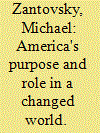

|
|
|
|
|
| Publication |
2014.
|
| Summary/Abstract |
It is not a new observation that, just as the twentieth century started late, with the shots in Sarajevo, so did the twenty-first century, with the September 11th attacks. Compared to the conflagration that followed the first event, whose centennial this year is a welcome opportunity for some belated soul-searching, the bloodshed that started with the second event has been limited, but its consequences may have been just as profound. The two American administrations that inherited the post-September 11th world have since struggled, along with the rest of the world, with the consequences. One chose to confront the evil head-on, in order to eradicate its sources and deter its repetition, with mixed results. The other largely opted for seeing and hearing little evil, with results that the jury is still out considering.
|
|
|
|
|
|
|
|
|
|
|
|
|
|
|
|
| 2 |
ID:
130241
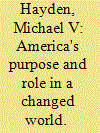

|
|
|
|
|
| Publication |
2014.
|
| Summary/Abstract |
I had never been a big fan of American exceptionalism. It was too self-referential, self-identifying, self-focused for my personal comfort. Then one bitterly cold day in February 1994, I was wandering through the open-air market in Sarajevo. The market had been hit by a single mortar round the previous weekend and sixty-eight people had been killed. Holes made by fragments from the 120-mm shell were still visible in the asphalt.
As I stared at the gouged surface in my battle dress and parka, Sarajevans began to come up to me, point to the small American flag on my upper sleeve, give a hesitant thumbs-up gesture, and whisper, almost prayerfully, "USA, USA."
Edward Snowden's leaks have fixated the media and the public on privacy and espionage, but the larger and more complex debate on protecting American security in the 21st century has been wanting.
At that point it became clear to me that it mattered less whether I thought America was exceptional. What mattered was that many people around the world thought that we were, and expected us to act accordingly. In many ways this is less something we have earned or even want, and more the product of historical circumstance. But a burden has clearly been ours, and when it is no longer ours the best judgment we can hope for is something along the lines of "As global hegemons go, these guys weren't bad." Now, under President Obama, the United States is involved in a redefinition or at least a recalibration of that exceptional role.
|
|
|
|
|
|
|
|
|
|
|
|
|
|
|
|
| 3 |
ID:
130242
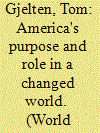

|
|
|
|
|
| Publication |
2014.
|
| Summary/Abstract |
The presidencies of George W. Bush and Barack Obama suggest what doesn't work in efforts to promote US influence in the world. By ordering an ill-conceived invasion of Iraq, Bush alienated US allies. His policies of secretly imprisoning Islamist militants and then subjecting them to "enhanced" interrogation and indefinite detention at Guantánamo struck Muslims everywhere as evidence of a war on Islam. Barack Obama, elected as the most explicitly anti-war president since Woodrow Wilson, came into office determined to undo the international damage done by his predecessor. "The walls between old allies on either side of the Atlantic cannot stand," Obama said in Berlin in 2008, and a year later, speaking in Cairo, he promised "a new beginning" with the Muslim world, with relations "based upon mutual interest and mutual respect." As promised, he withdrew US combat troops from Iraq. By 2013, however, Obama had fared little better than Bush in his global outreach. According to the Pew Research Center, support for the United States in Egypt, Jordan, Lebanon, and Pakistan was actually lower than it had been in the last year of the Bush administration. In Europe, the US favorability rating was higher than it was under Bush, but it had fallen steadily in the years since Obama took office, and it remained far below where it stood in 2000. One possible lesson from these years is that presidential personalities, speeches on foreign stages, and the changing international opinions of US policies matter less than we might think. Perhaps the most reliable measure of America's standing in the world is how appealing the country is to all those who are considering migration. Since 2007, Gallup surveys in more than one hundred and fifty countries have shown that the United States is far and away the number one favored destination. The most recent survey projected that one hundred and thirty-eight million people worldwide would like to move permanently to the United States, more than three times the number who would choose the United Kingdom, the second most favored destination. Those numbers show the United States still represents opportunity and promise to people around the world, and it is clearly in the US global interest to maintain that reputation.
|
|
|
|
|
|
|
|
|
|
|
|
|
|
|
|
| 4 |
ID:
106881
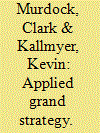

|
|
|
|
|
| Publication |
2011.
|
| Summary/Abstract |
This article hopes to contribute to the strategic content of U.S. foreign policy by offering a definition of grand strategy and case for reorienting U.S. policy around it. Rather than advocate a specific grand strategy-a matter still open for debate-the analysis concludes with a set of attributes to assess whether a proposed grand strategy constitutes a "good" grand strategy. It concludes by introducing the concept of an applied grand strategy approach, which may help to identify and assess the strategic implications of foreign policy choices.
|
|
|
|
|
|
|
|
|
|
|
|
|
|
|
|
| 5 |
ID:
098812
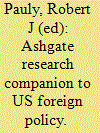

|
|
|
|
|
| Publication |
Surrey, Ashgate, 2010.
|
| Description |
x, 342p.
|
| Standard Number |
9780754648628, hbk
|
|
|
|
|
|
|
|
|
|
|
|
Copies: C:1/I:0,R:0,Q:0
Circulation
| Accession# | Call# | Current Location | Status | Policy | Location |
| 055219 | 327.73/PAU 055219 | Main | On Shelf | General | |
|
|
|
|
| 6 |
ID:
105575
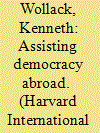

|
|
|
| 7 |
ID:
129803


|
|
|
|
|
| Publication |
2014.
|
| Summary/Abstract |
Looking primarily at the Israeli side of the conflict, one sees many factors that have contributed to the failure of past peace efforts, most of which may be present or repeated in current (2014) and possibly future - attempts at peace making.
|
|
|
|
|
|
|
|
|
|
|
|
|
|
|
|
| 8 |
ID:
095423
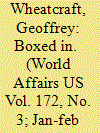

|
|
|
|
|
| Publication |
2010.
|
| Summary/Abstract |
In his keynote speech to the Republican convention, the chairman used most exalted words. After reviewing the record and achievements of the administration, he asked sonorously, "When have we rested more secure in friendship with all mankind?"
One of the tests English undergraduates have to endure is the "gobbet," an unidentified passage of literary or historical significance, whose date and author the examinee must guess. Maybe the arresting sentence just quoted will have stumped readers, but no one can possibly have dated that particular gobbet as 2008, or supposed that it was uttered by anyone at the last GOP convention in Minneapolis. John McCain and Sarah Palin, Lindsey Graham and Tom Ridge, could have said many other things. They might have boasted that the United States is the greatest nation on earth, or that it had never been more powerful, or that "We are winning," which is what Graham did say-but "friendship with all mankind"?
|
|
|
|
|
|
|
|
|
|
|
|
|
|
|
|
| 9 |
ID:
129799
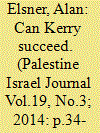

|
|
|
|
|
| Publication |
2014.
|
| Summary/Abstract |
During the many years of US Diplomacy in the Middle East, it has become a cliché to state that the United States cannot want peace more than the Israelis and Palestinians themselves.
|
|
|
|
|
|
|
|
|
|
|
|
|
|
|
|
| 10 |
ID:
129801
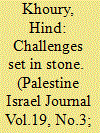

|
|
|
|
|
| Publication |
2014.
|
| Summary/Abstract |
What are the challenges to peace in 2014? The date is worth emphasizing, since attempts to broker peace in the Middle East are anything but new. In fact, the 1979 David Accords with Egypt are already 35 year old, and the Israeli-Palestinian peace process in entering its 23rd year. The process is growing stronger, but genuine peace is weakening by the day. In the meantime, there have been countless studies, articles, books, maps and reports addressing all aspects in the conflicts.
|
|
|
|
|
|
|
|
|
|
|
|
|
|
|
|
| 11 |
ID:
106594
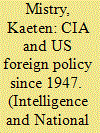

|
|
|
| 12 |
ID:
094621


|
|
|
| 13 |
ID:
124635
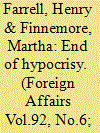

|
|
|
|
|
| Publication |
2013.
|
| Summary/Abstract |
The U.S. government seems outraged that people are leaking classified materials about its less attractive behavior. It certainly acts that way: three years ago, after Chelsea Manning, an army private then known as Bradley Manning, turned over hundreds of thousands of classified cables to the anti-secrecy group WikiLeaks, U.S. authorities imprisoned the soldier under conditions that the UN special rapporteur on torture deemed cruel and inhumane. The Senate's top Republican, Mitch McConnell, appearing on Meet the Press shortly thereafter, called WikiLeaks' founder, Julian Assange, "a high-tech terrorist."
|
|
|
|
|
|
|
|
|
|
|
|
|
|
|
|
| 14 |
ID:
125388
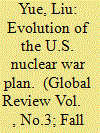

|
|
|
|
|
| Publication |
2013.
|
| Summary/Abstract |
On February 1, 2009 the US strategic command revised the latest edition of OPLAN 0810-08, to a newly revised plan named OPLAN 8010-08 change. this plan originates from the former nuclear war plan of the US government targeted at the two socialist countries, the Soviet Union and China, which had the formal name of SIOP.
|
|
|
|
|
|
|
|
|
|
|
|
|
|
|
|
| 15 |
ID:
101189
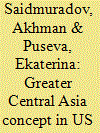

|
|
|
| 16 |
ID:
093512
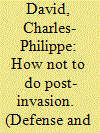

|
|
|
| 17 |
ID:
106823
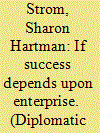

|
|
|
| 18 |
ID:
102947
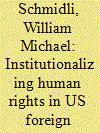

|
|
|
|
|
| Publication |
2011.
|
| Summary/Abstract |
This article examines U.S.-Argentine relations during the period of military dictatorship (1976-1983). I argue that during the Gerald R. Ford administration, Secretary of State Henry Kissinger's subtle support for the Argentine military junta-despite widespread state-sanctioned violence against perceived subversives-was a continuation of a historical process rooted in the early years of the Cold War: U.S. support for anticommunist Latin American military establishments. By contrast, Jimmy Carter's effort to promote human rights in U.S.-Argentine relations was a courageous effort to fulfill his campaign promise to bring "competence and compassion" to the Oval Office. Although clearly not unlimited, Carter's emphasis on human rights, particularly evident in his selection of Patricia Derian as Assistant Secretary of State for Human Rights and Humanitarian Affairs, provided an unprecedented government-sanctioned arena for human rights advocacy.
|
|
|
|
|
|
|
|
|
|
|
|
|
|
|
|
| 19 |
ID:
106958
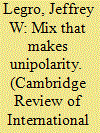

|
|
|
|
|
| Publication |
2011.
|
| Summary/Abstract |
The nature of a global arena dominated by one great power remains a critical subject for understanding international relations. Brooks and Wohlforth's recent book makes an important contribution by arguing that unipolarity poses few constraints to the hegemon and that the United States today should pursue a policy of primacy. The puzzle is that the United States has mostly resisted a primacy policy since becoming the sole superpower, and when it has done so, has often been less successful than the promise of its power advantage. Explaining this puzzle requires building on 'the no constraint' approach to develop a positive theory based on hegemonic purpose, a reformulated notion of constraints, and how purpose and constraints interact to shape outcomes. This reformulation suggests that any American strategy that looks like 'primacy' is unlikely to succeed.
|
|
|
|
|
|
|
|
|
|
|
|
|
|
|
|
| 20 |
ID:
101234
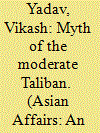

|
|
|
|
|
| Publication |
2010.
|
| Summary/Abstract |
The idea that there is a moderate faction of the Taliban (from a Western liberal perspective) or that the policies of the Taliban can be moderated to support a constitutional democracy has been a persistent myth across three U.S. presidential administrations. In this article, the author examines the actual governing structure, ideology, and social networks of the Taliban explains why a discrete and ideologically identifiable moderate faction with moderate policy objectives has failed to materialize. The author concludes that the consistent dissemination of this myth despite any substantial evidence reflects the imperative to expedite an exit policy as well as the United States' limited long-term interests in Afghanistan, Pakistan, and the South Asia region.
|
|
|
|
|
|
|
|
|
|
|
|
|
|
|
|
|
|
|
|
|